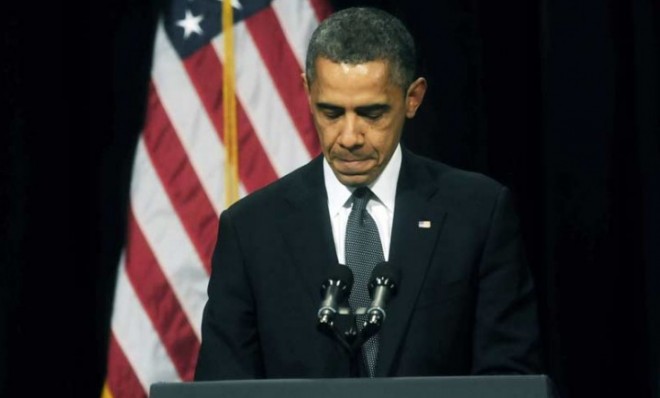Obama's spectacular speech — and how it dooms his push for gun regulation
Now the NRA can rely on widespread animus to Obama to crush the renewed push for tighter gun laws

A free daily email with the biggest news stories of the day – and the best features from TheWeek.com
You are now subscribed
Your newsletter sign-up was successful
On Sunday night, President Obama delivered one of the finest prepared speeches I have heard in a very long time. In addressing Friday's terrible events in Newtown, Conn., the president oozed the sort of raw sincerity and grief that simply cannot be manufactured. "We can't tolerate this anymore," the president said. "These tragedies must end. And to end them, we must change." It really was a great speech.
It was also a tactical catastrophe that almost certainly ensures that this president will never sign into law a bill regulating firearms.
Obama should know better by now. Smart people warned of the perils of this path. Appearing on Face the Nation hours before President Obama began his remarks, my mentor and former boss, David Frum, explained that "[t]he president's role here will not be helpful. The more this becomes an issue of conventional politics, the more it is doomed to failure. The most successful public safety campaign of our lifetimes was Mothers Against Drunk Driving. That wasn't launched by President Carter or President Reagan. That was launched by people outside the political system."
The Week
Escape your echo chamber. Get the facts behind the news, plus analysis from multiple perspectives.

Sign up for The Week's Free Newsletters
From our morning news briefing to a weekly Good News Newsletter, get the best of The Week delivered directly to your inbox.
From our morning news briefing to a weekly Good News Newsletter, get the best of The Week delivered directly to your inbox.
If anything, David may have understated the degree to which the president’s involvement would doom any movement toward regulation. Before the president spoke on Sunday night, Sen. Dianne Feinstein, who will re-introduce the assault weapons ban on Monday, was the public face of the coming movement to regulate firearms. While political junkies may have strong opinions about Feinstein, the mention of her name does not exactly stir the emotions of your average American citizen. Most Americans outside of the District of Columbia or the state of California probably don't even know who she is. And those who do probably know nothing beyond the fact that she is a liberal Democrat from California. The NRA was never going to be able to rely on the public’s distrust of Sen. Feinstein to create the requisite political pressure necessary to crush the regulation movement before it gains momentum.
Barack Obama, however, is an entirely different story. When a president publicly advocates on behalf of legislation, the fate of legislative proposals invariably becomes tied to the president and all of the feelings — good or bad — that mere mention of any president’s last name (be it Obama, Bush, or Clinton) invariably stirs up in the citizenry. By injecting himself into the debate, the president enabled gun rights advocates to run a campaign that taps into all of the passion and suspicion that Obama inspires on the Right, including those who might have been inclined to view reasonable gun restrictions in a positive, or at the very least, inoffensive light.
It was always going to be hard to pass legislation regulating firearms. A new Huffington Post/YouGov survey found that support for gun regulation was (not surprisingly) up in the wake of the Newtown tragedy. By up, they mean that half the country supports more restrictive gun regulation. That number is, to put it very mildly, soft. If only half of the country supports more regulation two days after 20 children were ruthlessly murdered by a young man using legally purchased weapons, the regulation movement never had much hope to begin with. And the president’s involvement will only stir up the passionate opponents of regulation as well as the significant number of people who dislike the president no matter what he says or supports.
There is also a broader point here about President Obama: He has an astonishing belief in his own powers of persuasion — a belief that is not supported by any evidence. Obama needs to learn that sometimes, the path to success calls for private conversations with lawmakers, not rousing speeches. After all, presidential communication is not an end in itself, but rather a means to an end. Until President Obama internalizes this lesson, he will continue to leave a legacy defined by lots of sizzle and almost no steak.
A free daily email with the biggest news stories of the day – and the best features from TheWeek.com
Jeb Golinkin is a 3L at the University of Texas School of Law. From 2008 to 2011, he served as an editor and reporter for FrumForum. Follow Jeb on Twitter: @JGolinkin.
Jeb Golinkin is an attorney from Houston, Texas. You can follow him on twitter @jgolinkin.